- Home
- James Herriot
The Lord God Made Them All
The Lord God Made Them All Read online
The Lord God Made Them All
James Herriot
TO ZOE
latest beautiful grandchild
All things bright and beautiful,
All creatures great and small,
All things wise and wonderful,
The Lord God made them all.
—CECIL FRANCES ALEXANDER, 1818-1895
CONTENTS
Chapter 1
Chapter 2
Chapter 3
Chapter 4
Chapter 5
Chapter 6
Chapter 7
Chapter 8
Chapter 9
Chapter 10
Chapter 11
Chapter 12
Chapter 13
Chapter 14
Chapter 15
Chapter 16
Chapter 17
Chapter 18
Chapter 19
Chapter 20
Chapter 21
Chapter 22
Chapter 23
Chapter 24
Chapter 25
Chapter 26
Chapter 27
Chapter 28
Chapter 29
Chapter 30
Chapter 31
Chapter 32
Chapter 33
Chapter 34
Chapter 35
Chapter 36
Chapter 37
Chapter 38
Chapter
1
WHEN THE GATE FELL on top of me I knew I was really back home.
My mind drifted effortlessly back to the days before my spell in the R.A.F., and I recalled the last time I had visited the Ripleys. It was to “nip some calves,” as Mr. Ripley said over the phone, or more correctly to emasculate them by means of the Burdizzo bloodless castrator, and with his summons I realised that a large part of my morning had gone.
It was always something of a safari to visit Anson Hall, because the old house lay at the end of a ridged and rutted track that twisted across the fields through no fewer than seven gates.
Gates are one of the curses of a country vet’s life and in the Yorkshire Dales, before the coming of cattle grids, we suffered more than most. We were resigned to opening two or three on many farms but seven was a bit much. And at the Ripleys’ it wasn’t just the number but the character.
The first one, which led off the narrow road, was reasonably normal—an ancient thing of rusty iron—but when unlatched, it did at least swing round, groaning on its hinges. It was the only one that swung; the others were of wood and of the type known in the Dales as “shoulder gates.” I could see how they got their name as I hoisted each one up, balanced the top spar on my shoulder and dragged it round. These had no hinges but were tied at one end with binder twine, top and bottom.
Even with an ordinary gate there is a fair amount of work involved. You have to stop the car, get out, open the gate, drive through, stop the car again, dismount and close the thing behind you. But the road to Anson Hall was hard labour. The gates deteriorated progressively as I approached the farm, and I was puffing with my efforts as I bumped and rattled my way up to number seven.
This was the last and the most formidable—a malignant entity with a personality of its own. Over decades it had been patched and repaired with so many old timbers that probably none of the original structure remained. But it was dangerous.
I got out of the car and advanced a few steps. We were old foes, this gate and I, and we faced each other for some moments in the silence. We had fought several brisk rounds in the past and there was no doubt the gate was ahead on points.
The difficulty was that, apart from its wobbly, loosely nailed eccentricity, it had only one string hinge, halfway down. This enabled it to pivot on its frail axis with deadly effect.
With the utmost care I approached the right-hand side and began to unfasten the binder twine. The string, I noted bitterly, like all the others was neatly tied in a bow, and as it fell clear I grabbed hastily at the top spar. But I was too late. Like a live thing the bottom rail swung in and rapped me cruelly on the shins, and as I tried to correct the balance the top bashed my chest.
It was the same as all the other times. As I hauled it round an inch at a time, the gate buffeted me high and low. I was no match for it.
It was no help to see Mr. Ripley watching me benevolently from the farmhouse doorway. While I wrestled the gate open, contented puffs rose from the farmer’s pipe and he did not stir from his position until I had hobbled over the last stretch of grass and stood before him.
“Now then, Mr. Herriot, you’ve come to nip me a few calves?” A smile of unaffected friendship creased the stubbled cheeks. Mr. Ripley shaved once a week—on market day—considering, with some logic, that since only his wife and his cattle saw him on the other six days there was no point in scraping away at his face every morning with a razor.
I bent and massaged my bruised ankles. “Mr. Ripley, that gate! It’s a menace! Do you remember that last time I was here you promised me faithfully you’d have it mended? In fact you said you’d get a new one—it’s about time, isn’t it?”
“Aye, you’re right, young man,” Mr. Ripley said, nodding his head in profound agreement. “Ah did say that, but tha knaws, it’s one o’ them little jobs which never seem to get done.” He chuckled ruefully, but his expression altered to concern when I wound up my trouser leg and revealed a long abrasion on my shin.
“Eee, that’s a shame; that’s settled it. There’ll be a new gate on there by next week. Ah’ll guarantee it.”
“But Mr. Ripley, that’s exactly what you said last time when you saw the blood running down my knee. Those were your very words. You said you’d guarantee it.”
“Aye, I knaw, I knaw.” The farmer tamped down the tobacco with his thumb and got his pipe going again to his satisfaction. “Me missus is allus on to me about me bad memory, but don’t worry, Mr. Herriot, I’ve had me lesson today. I’m right sorry about your leg, and that gate’ll never bother ye again. Ah guarantee it.”
“Okay, okay,” I said and limped over to the car for the Burdizzo. “Where are the calves, anyway?”
Mr. Ripley crossed the farmyard unhurriedly and opened the half door on a loose box. “They’re in there.”
For a moment I stood transfixed as a row of huge, shaggy heads regarded me impassively over the timbers, then I extended a trembling finger. “Do you mean those?”
The farmer nodded happily. “Aye, them’s them.”
I went forward and looked into the box. There were eight strapping yearlings in there, some of them returning my stare with mild interest, others cavorting and kicking up their heels among the straw. I turned to the farmer. “You’ve done it again, haven’t you?”
“Eh?”
“You asked me to come and nip some calves. Those aren’t calves, they’re bulls! And it was the same last time. Remember those monsters you had in the same box? I nearly ruptured myself closing the nippers, and you said you’d get them done at three months old in future. In fact you said you’d guarantee it.”
The farmer nodded solemnly in agreement. He always agreed one hundred percent with everything I said. “That’s correct, Mr. Herriot. That’s what ah said.”
“But these animals are at least a year old!”
Mr. Ripley shrugged and gave me a world-weary smile. “Aye, well, time gets on, doesn’t it? Fairly races by.”
I returned to the car for the local anaesthetic. “All right,” I grunted as I filled the syringe. “If you can catch them I’ll see what I can do.” The farmer lifted a rope halter from a hook on the wall and approached one of the big beasts, murmuring encouragingly. He snared the nose with surprising ease, dropping the loops over nose and horn with perfect ti
ming as the animal tried to plunge past him. Then he passed the rope through a ring on the wall and pulled it tight.
“There y’are, Mr. Herriot. That wasn’t much trouble was it?”
I didn’t say anything. I was the one who was going to have the trouble. I was working at the wrong end, nicely in range of the hooves which would surely start flying if my patients didn’t appreciate having a needle stuck into their testicles.
Anyway, it had to be done. One by one I infiltrated the scrotal area with the local, taking the blows on my arms and legs as they came. Then I started the actual process of castration, the bloodless crushing of the spermatic cord without breaking the skin. There was no doubt this was a big advance on the old method of incising the scrotum with a knife and in little calves it was a trifling business lasting only a few seconds.
But it was altogether different with these vast creatures. It was necessary to open the arms of the Burdizzo beyond right angles to grip the great fleshy scrotum, and then they had to be closed again. That was when the fun started.
Thanks to my injection the beast could feel little or nothing, but as I squeezed desperately it seemed that I was attempting the impossible. However, it is amazing what the human frame can accomplish when pushed to the utmost, and as the sweat trickled down my nose and I gasped and strained, the metal arms inched closer until the jaws finally clicked together.
I always nipped each side twice, and I took a rest before repeating the process lower down the cord. When I had done the same with the other testicle I flopped back against the wall, panting and trying not to think of the other seven beasts still to do.
It was a long, long time before I got to the last one and I was wrestling away, pop-eyed and open-mouthed, when the idea came to me.
I straightened up and came along the side of the animal. “Mr. Ripley,” I said breathlessly, “why don’t you have a go?”
“Eh?” The farmer had been watching me with equanimity, blowing out slow clouds of blue smoke, but it was plain that I had jolted him out of his composure. “What d’ye mean?”
“Well, this is the last one, and I want you to understand what I’ve been talking about. I’d like to see you close those nippers.”
He thought the matter over for a moment or two. “Aye, but who’s goin’ to hold t’beast?”
“That’s all right,” I said. “We’ll tie him up short to the ring and I’ll set everything up for you, then we’ll see how you get on.”
He looked a little doubtful but I was determined to make my point and ushered him gently to the rear end of the animal. I enclosed the scrotum in the Burdizzo and placed Mr. Ripley’s fingers round the handles.
“Right,” I said. “Off you go.”
The farmer took a long breath, braced himself and began to exert pressure on the metal arms. Nothing happened.
I stood there for several minutes as his face turned red, then purple, his eyes protruded even further than mine and the veins on his forehead stood out in livid ridges. Finally he gave a groan and dropped to his knees.
“Nay, lad, nay, it’s no good, I can’t do it.”
He got to his feet slowly and mopped his brow.
“But Mr. Ripley.” I put a hand on his shoulder and smiled kindly at him. “You expect me to do it.”
He nodded dumbly.
“Ah well, never mind,” I said. “You understand now what I’ve been talking about. This is an easy little job made difficult by leaving it until the beasts are as big as this. If you’d called me out when they were calves of three months, I’d have been on and off your place in a few minutes, wouldn’t I?”
“Aye, you would, Mr. Herriot, you’re right. I’ve been daft, and I’ll see it doesn’t happen again.”
I felt really clever. I don’t often have moments of inspiration, but the conviction swelled in me that one of them had come to me today. I had finally got through to Mr. Ripley.
The feeling of exhilaration gave me added strength and I finished the job effortlessly. As I walked to the car I positively glowed, and my self-satisfaction deepened when the farmer bent to the window as I started the engine.
“Well, thank ye, Mr. Herriot,” he said. “You’ve taught me summat this mornin’. Next time ye come I’ll have a nice new gate for ye and I’ll never ask ye to nip big beasts like that again. Ah guarantee it.”
All that had happened a long time ago, before the R.A.F., and I was now in the process of reinserting myself into civilian life, tasting the old things I had almost forgotten. But at the moment when the phone rang I was tasting something very near to my heart—Helen’s cooking.
It was Sunday lunchtime, when the traditional roast beef and Yorkshire pudding were served. My wife had just dropped a slab of the pudding on my plate and was pouring gravy over it, a rich, brown flood with the soul of the meat in it and an aroma to dream of. I was starving, after a typical country vet’s Sunday morning of rushing round the farms and I was thinking, as I often did, that if I had some foreign gourmet to impress with the choicest sample of our British food, then this is what I would give him.
? great chunk of Yorkshire pud and gravy was the expedient of the thrifty farmers to fill their families’ stomachs before the real meal started—“Them as eats most puddin’ gets most meat,” was the wily encouragement—but it was heaven. And as I chewed my first forkful I was happy in the knowledge that when I had cleared my plate Helen would fill it again with the beef itself and with potatoes, peas and runner beans gathered from our garden that morning.
The shrilling phone cut cruelly into my reverie, but I told myself that nothing was going to spoil this meal. The most urgent job in veterinary practice could wait until I had finished.
But my hand shook as I lifted the receiver, and a mixture of anxiety and disbelief flowed through me as I heard the voice at the other end. It was Mr. Ripley. Oh please, no, not that long, long trek to Anson Hall on a Sunday.
The farmer’s voice thundered in my ear. He was one of the many who still thought you had to bawl lustily to cover the miles between.
“Is that vitnery?”
“Yes, Herriot speaking.”
“Oh, you’re back from t’war, then?”
“Yes, that’s right.”
“Well, ah want ye out here right away. One of me cows is right bad.”
“What’s the trouble? Is it urgent?”
“Aye, it is! I think she’s maybe broke ’er leg!”
I held the ear piece away from me. Mr. Ripley had increased his volume, and my head was beginning to ring. “What makes you think that?” I asked, suddenly dry-mouthed.
“Well, she’s on three legs,” the farmer blasted back at me. “And t’other’s sort of hangin’, like.”
Oh God, that sounded horribly significant. I looked sadly across the room at my loaded plate. “All right, Mr. Ripley, I’ll be along.”
“You’ll come straight away, won’t ye? Right now?” The voice was an importunate roar.
“Yes, I’ll come straight away.” I put down the receiver, rubbed my ear and turned to my wife.
Helen looked up from the table with the stricken face of a woman who can visualise her Yorkshire pudding sagging into lifeless ruin. “Oh surely you don’t have to go this minute?”
“I’m sorry, Helen, this is one of those things I can’t leave.” I could picture only too easily the injured animal plunging around in her agony, perhaps compounding the fracture. “And the man sounds desperate. I’ve just got to go.”
My wife’s lips trembled. “All right, I’ll put it in the oven till you come back.”
As I left I saw her carrying the plate away. We both knew it was the end. No Yorkshire pud could survive a visit to Anson Hall.
I increased my speed as I drove through Darrowby. The cobbled market place, sleeping in the sunshine, breathed its Sunday peace and emptiness with all the inhabitants of the little town eating busily behind closed doors. Out in the country the dry stone walls flashed by as I kept my foot on the boards, and wh
en I finally arrived at the beginning of the farm track I had a sense of shock.
It was the first time I had been there since I had left the service, and I suppose I had been expecting to find something different. But the old iron gate was just the same, except that it was even more rusty than before. With a growing feeling of doom I fought my way through the other gates, untying the strings and shouldering the top spars round till finally I came to number seven.
This last and most terrible of the gates was still there, and unchanged. It couldn’t be true, I told myself as I almost tiptoed towards it. All sorts of things had happened to me since I had last seen it. I had been away in a different world of marching and drilling and learning navigation and finally flying an aeroplane, while this rickety structure stood there unheeding.
I eyed it closely. The loose-nailed wobbly timbers were as before, as was the single string hinge—probably the same piece of string. It was unbelievable. And then I noticed something different. Mr. Ripley, apparently worried lest his livestock might rub against and damage the ancient bastion, had festooned the thing with barbed wire.
Maybe it had mellowed with time. It couldn’t be as vicious as before. Gingerly I loosened the bottom string on the right-hand side, then with infinite care I untied the bow at the top. I was just thinking that it was going to be easy when the binder twine fell away and the gate swung with all its old venom on the left-hand string.
It got me on the chest first, then whacked against my legs, and this time the steel barbs bit through my trousers. Frantically I tried to throw the thing away from me, but it pounded me high and low and when I leaned back to protect my chest, my legs slid from under me and I fell on my back. And as my shoulders hit the track, the gate, with a soft woody crunch, fell on top of me.
I had been nearly underneath this gate several times in the past and had got clear at the last moment, but this time it had really happened. I tried to wriggle out, but the barbed wire had my clothing in its iron grip. I was trapped.
I craned desperately over the timbers. The farm was only fifty yards away, but there was not a soul in sight. And that was a funny thing. Where was the anxious farmer? I had expected to find him pacing up and down the yard, wringing his hands, but the place seemed deserted.

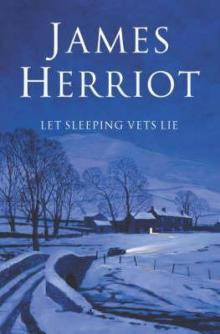 Let Sleeping Vets Lie
Let Sleeping Vets Lie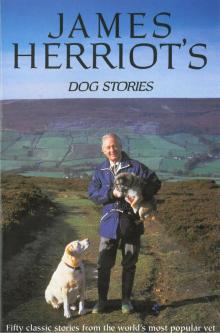 James Herriot's Dog Stories
James Herriot's Dog Stories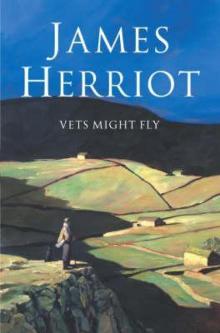 Vets Might Fly
Vets Might Fly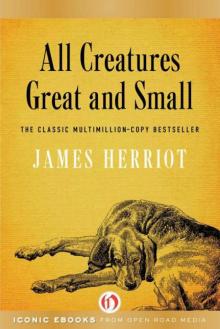 All Creatures Great and Small
All Creatures Great and Small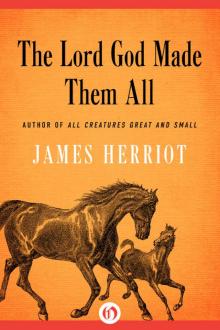 The Lord God Made Them All
The Lord God Made Them All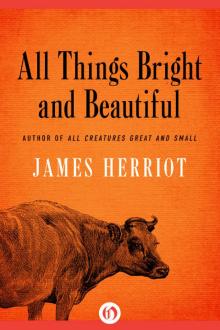 All Things Bright and Beautiful
All Things Bright and Beautiful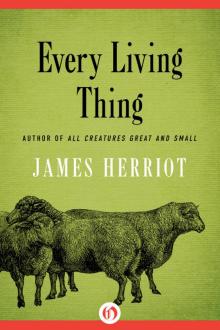 Every Living Thing
Every Living Thing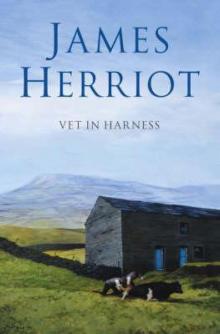 Vet in Harness
Vet in Harness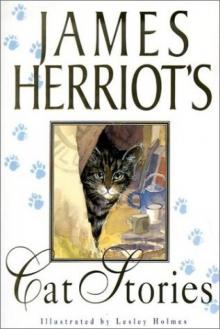 James Herriot's Cat Stories
James Herriot's Cat Stories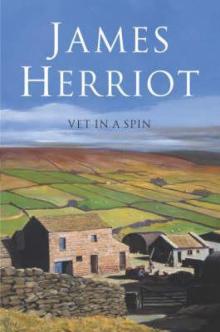 Vet in a Spin
Vet in a Spin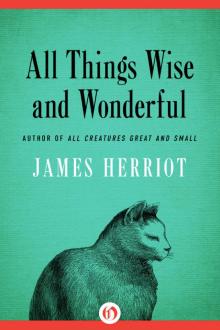 All Things Wise and Wonderful
All Things Wise and Wonderful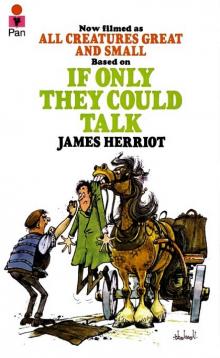 If Only They Could Talk
If Only They Could Talk